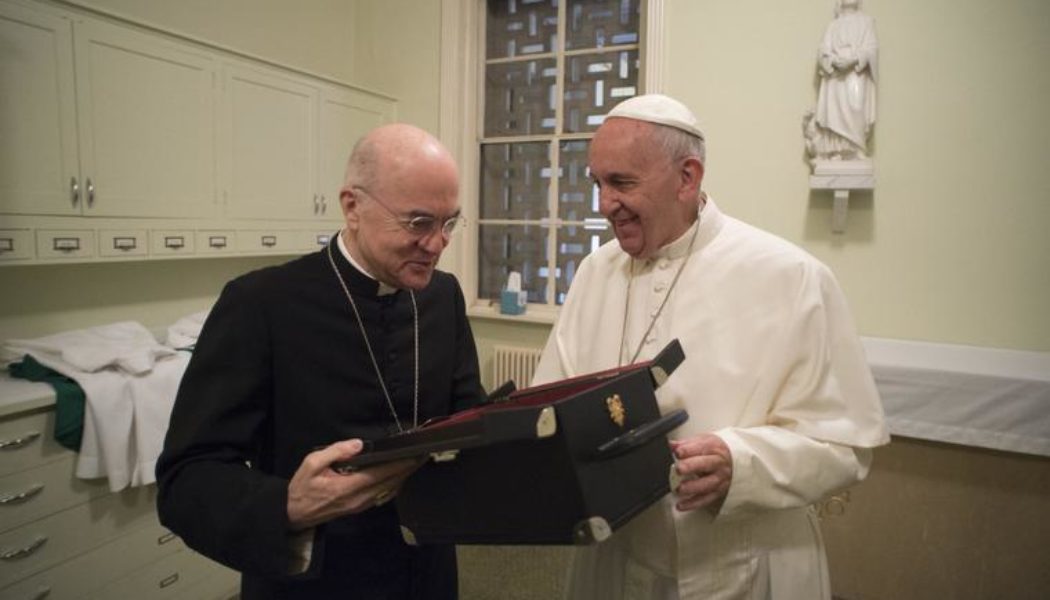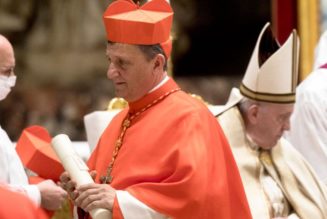
Archbishop Carlo Maria Viganò has been charged with schism and summoned for a proceeding at the Dicastery for the Doctrine of the Faith (DDF). In reply to those serious charges, he issued an inflammatory response — Vatican II is a “cancer,” “Bergoglio” is illegitimate — and refused to answer the summons. The Vatican has given him until Friday to respond, either in writing or in person, or he “will be judged in his absence.”
Here are five considerations on the complex issues at play.
He Seeks Separation From the Church
Like the Br’er Rabbit stories, it seems that Archbishop Viganò wants to be thrown into the briar patch, eager for the disciplinary consequences of his actions. Why he regards the briar patch as welcome territory is a matter for speculation.
It is quite possible to offer criticism — constructive or otherwise — of Pope Francis and his program without questioning either his legitimacy or that of the Second Vatican Council. Many Catholic voices do so, of both the conservative and progressive kind. Archbishop Viganò is singular among bishops — to say nothing of former curial officials and nuncios — in his extreme positions. Even those sympathetic to some of his positions have urged him to abandon his use of “irreverent and disrespectful language.”
Given Archbishop Viganò’s wide experience, it must be considered that he has chosen to be so provocative precisely because he desires to provoke. Canonical discipline — excommunication or worse — may be exactly what the archbishop wants. But there is a distinction between the finding and the punishment.
Finding Archbishop Viganò guilty of schism would simply confirm what many observers have long thought, namely that his stated positions put him outside communion with the Holy Father. Archbishop Viganò himself may well think so, given his desire not to be in communion with “Bergoglio,” whom he regards as not being the legitimate pope.
Canon law usually offers a range of options for penalties. Rome may choose a more or less severe option precisely in light of Archbishop Viganò’s evident desire to provoke a response. That he has been provocative is clear; Rome can choose how provoked it wishes to be. The Holy See is not obliged to give him what he apparently wants.
His Mental Health Has to Be a Question
Canonist Ed Condon of The Pillar notes that the charge of schism against Archbishop Viganò is considered by many to be “long overdue,” that he has been on “a steep downward trajectory,” denouncing Pope Francis in “canonically unambiguous terms.”
So imagining himself appointed a defense attorney for Archbishop Viganò, Condon wonders what kind of defense might be offered. He suggests that the best defense would be that the archbishop is suffering from some sort of diminished capacity. Perhaps he has suffered some kind of mental or emotional breakdown and has gone mad.
There is something to that. His conduct since 2018, when he launched his first statement against Pope Francis, related to then-Cardinal Theodore McCarrick, has been ever more erratic. He lives in seclusion. Does he have delusions of danger? Is he perhaps surrounded — or even confined — by associates of a dubious nature? What information does he receive in his auto-isolation?
Consider, in contrast, that Cardinal Joseph Zen, emeritus bishop of Hong Kong, who lives under constant surveillance by the Chinese communist authorities, moves about freely, speaks freely and is open to questions. And he has offered some stinging criticisms of recent Vatican initiatives.
When a lone bishop — there are more than 5,000 the world over — acts in a manner utterly singular and manifestly odd, it is legitimate to question why that might be. Madness cannot be ruled out and courts are obliged, in justice, to take that possibility into account in pronouncing sentence.
Schism Is Grave Matter
In announcing — and denouncing — his summons by the DDF, Archbishop Viganò compared himself to Archbishop Marcel Lefebvre, founder of the Society of St. Pius X in the 1970s, and excommunicated in 1988 for consecrating bishops without a papal mandate.
Archbishop Viganò flatters himself. Archbishop Lefebvre, for all his subsequent troubles, was an admirable missionary in Africa for many years. Far from going into hiding, he founded a community. Archbishop Viganò was likely observing that many of Archbishop Lefebvre’s followers considered his punishment harsh compared to the latitude granted to many others in the 1970s.
It’s a critical point that Vatican officials will need to make. What is considered grave from a canonical point of view does not comport with popular opinion. For example, discarding the Holy Eucharist is punished by automatic excommunication. Serial murder is not. There are good reasons why that is so, and it requires an awareness that supernatural matters are more grave than natural ones.
Schism is like that. Rupturing the communion of the Church threatens to cut the faithful off from sacramental grace. Being outside communion here below can lead to being outside the communion of saints in eternity. That’s why the Church takes schism so seriously, even if it does not engender in the popular mind the same revulsion as, say, sexual abuse.
‘Whataboutism’ Abounds
The term “whataboutism” has entered political and cultural debates in recent years. One side criticizes Donald Trump for his treatment of women. Instead of addressing the charge per se, his side says, “What about Bill Clinton”?
Every schoolteacher — and parent, for that matter — knows that “whataboutism” arises in matters of discipline. A child disciplined for X asks, “What about so-and-so who also did X and did not get punished?” Or, “What about the other child who did Y, which is worse than X?”
It was a mere matter of hours after the news about Archbishop Viganò before the headline appeared, “Viganò schism trial a long time coming … now do Rupnik.”
Other names could be substituted, but ex-Jesuit Father Marko Rupnik, is the most famous disciplinary case outstanding at the moment. He has been under investigation from some time, expelled by the Society of Jesus, and the global outrage over his continued ministry forced Pope Francis to order a new investigation last fall after previously shutting one down due to the statute of limitations.
“Whataboutism” is not a convincing reason that discipline against X cannot proceed because it has not been employed against Y. But if a sufficient number of people believe that discipline is inequitably applied, does it threaten the credibility of the relevant authority?
Cardinal Parolin Pours Oil on the Waters
A welcome intervention on the Archbishop Viganò’s summons came from a high authority, Cardinal Pietro Parolin, the Holy Father’s secretary of state. He struck a tone of admiration and sadness, remaining bewildered by it all.
“I always appreciated him as a great worker, very faithful to the Holy See, in a certain sense also an example,” Cardinal Parolin said of the former papal ambassador to the United States. “When he was apostolic nuncio he worked extremely well, I don’t know what happened.”
Archbishop Viganò had a career in which he was held in high esteem. His first appointment as an apostolic nuncio, under St. John Paul II, was to Nigeria, perhaps the most important posting in Africa. He then returned to Rome in a highly sensitive position, the delegate for pontifical representations, a sort of personnel chief and supervisor of diplomats worldwide. Then he served as secretary general of the Vatican City State, earning a reputation for effective governance and rooting out corruption. Returning to the nuncio’s role in the United States, he was widely respected upon his retirement in 2016.
When Archbishop Viganò made his initial declaration in 2018, several U.S. bishops expressed confidence in his reputation for honesty and said that his claims should be investigated. Since then, many of the same have come to regard him as unhinged.
Cardinal Parolin’s honest remarks are a welcome counter to those who wish to read the Archbishop Viganò of recent years back into his past, and thereby condemn by association those who praised him before his downward trajectory became evident.
Now that it is evident to all, judicious comments from all quarters will be needed to contain the damage Archbishop Viganò has done.






![Berlin is building a “church about nothing.” Looks like the Communist goal of secularizing East Germany was successful after all [WSJ paywall]…](https://salvationprosperity.net/wp-content/uploads/2021/04/berlin-is-building-a-church-about-nothing-looks-like-the-communist-goal-of-secularizing-east-germany-was-successful-after-all-wsj-paywall-327x219.jpg)


